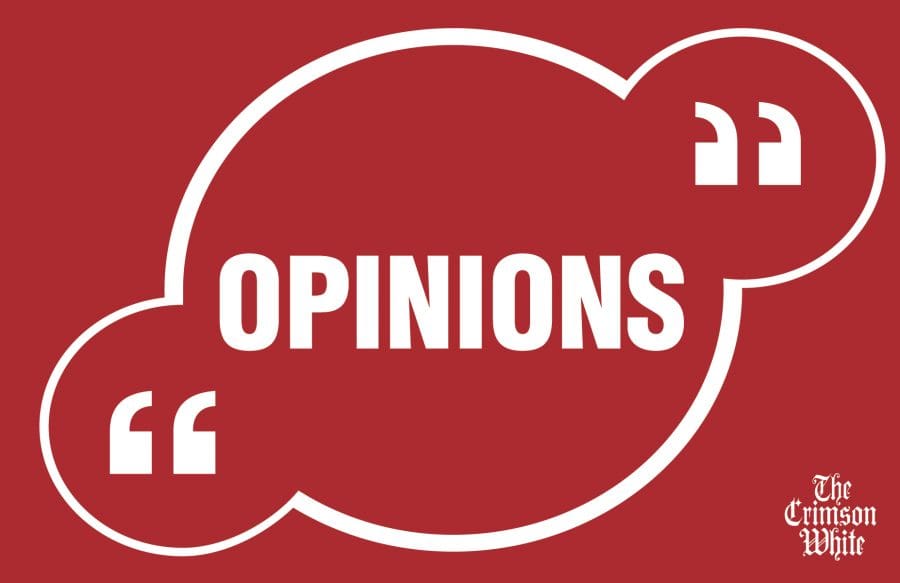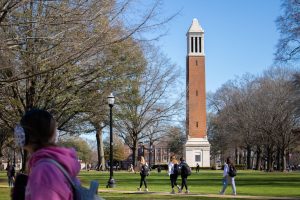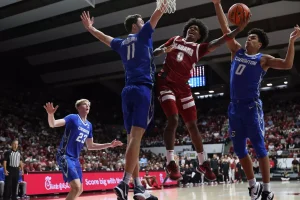Opinion | Student journalism is under attack
February 16, 2022
On Thursday, Feb. 10, Texas A&M University President Katherine Banks informed The Battalion, the university’s student newspaper, that it would be required to cease print editions, effective immediately. This decision was reversed the next day after retaliation from the student body. The newspaper will continue printing through the end of the semester.
This conflict, however, is far from over.
This move by Banks is nothing more than an abuse of power and an embarrassing attempt to control the student voices of Texas A&M. In a statement, Banks argued that this decision would enable a shift to digital media, declaring a “new era.”
By attempting to start this new era in the present, Banks is erasing decades of Texas A&M’s past. The Battalion has been printing weekly editions for 129 years. Texas A&M University has crafted its culture through its traditions. In one move, Banks has dishonored these traditions and the image of Texas A&M as an institution.
The move from print media represents an ongoing debate in the world of journalism. With the increasing prevalence of digital media in the form of TV, podcasts and social media, physical newspapers can seem archaic.
In 2018, the CEO of The New York Times, Mark Thompson, predicted that print journalism would survive for only 10 more years. With that deadline just six years from now, the decision at Texas A&M may be one of many like it.
Print media is expensive. It’s not as accessible as digital media. It represents the past, and Banks claims to be pioneering her university into the future.
Despite these disadvantages of print media, we at The Crimson White still champion its value. Our editors and writers know well the sense of achievement at seeing your name on a physical page. To see our dedication realized in a tangible way affirms what we do as a student newspaper. It reminds us that we are honored with the responsibility to inform this campus and to uplift its voices.
After the COVID-19 pandemic halted The CW’s twice-weekly print editions in March 2020, we were unable to print again until April 2021. Now, we have returned to a monthly print publication schedule.
We recognize the benefits of print media for our audience. While digital media is undoubtedly valuable, it excludes certain populations of viewers, such as older generations that are less likely to have computer literacy.
Print media also encourages its readers to engage. When perusing digital content, it is easy to be distracted. Reading a physical copy of the news compels the reader to view the news not as an isolated event in their day, but as a representation of the world they participate in.
We at The CW are not ignorant of the changing atmosphere of journalism. However, we are not alone in seeing the value of print.
After Banks’ decision, Texas A&M received so much public outcry that Banks announced that the working group involved in The Battalion’s transition would devise solutions to continue printing. Some members of The Battalion’s leadership have also been added to this working group, meaning the process will finally have student voices, as it should have from the start.
Ironically, this update illuminates the purpose of student journalism: to hold universities accountable. The student reaction to Banks’ decision was so powerful that it enacted a meaningful change. Those at The CW are familiar with this kind of relationship with The University of Alabama.
After the misguided decision to include Bibbs Graves’ name in the recently renamed Autherine Lucy Hall, The CW, alongside many student voices at the university, rallied against the injustice. Though the University finally preserved Lucy’s legacy by removing Graves’ name from her building, this instance shows that our university still needs to be held accountable.
Banks, and the administration at Texas A&M, fear this kind of accountability. While Banks justified her initial decision, the relevance of print media is a facade for the real issue: the independence of student journalists on college campuses. The move to digital media will be coupled with a shift to house the student newspaper in Texas A&M’s Department of Journalism.
This shift may seem logical, but it means that The Battalion will be forced to join under the Department of Journalism or risk losing its faculty adviser and workspace. Or, more directly, The Battalion will either have to agree to further oversight or stop pursuing its work.
This increased degree of scrutiny faced by The Battalion is not the first measure to control student organizations at Texas A&M. In October 2021, the university passed rule 9.02 for student organizations. The rule states that “a member’s official messaging, such as signage, social media postings, press releases, news media interviews, and website postings, must be approved in accordance with applicable member rules or procedures.”
The fact that a university president can unilaterally dismantle a decades-old institution isn’t just concerning; it violates a long tradition of student rights, both in and out of the newsroom. Starting with Tinker v. Des Moines, the U.S. has considered student rights as their own legal conversation for decades. To threaten student journalism is to invoke the First Amendment itself.
Most students don’t have the luxury of becoming plaintiffs in a Supreme Court decision. They must simply hope that their administrations will continue to allow their organizations to exist.
The events at Texas A&M are not exclusive to that university or state. They apply directly to our own campus, and the future of student journalism itself. For 129 years, The Battalion operated independently. This history was undone by a single person in a single moment.
When we witness events like those at Texas A&M, we are more emboldened than ever to promote student journalism.
Texas A&M is not the only university that has made changes to its student newspaper. Student newspapers around the country have faced censorship and loss of funds. These changes, rather than indicating the irrelevance of student media, do the exact opposite. They prove its continued necessity.
Banks’ attempt to exert control over the Battalion demonstrates that she understands the power and potential of student voices: the same student voices that compelled her to revisit her decision, and the same ones that expose The University of Alabama for its racist past.
Student journalism serves as a mirror for a college campus. If Banks, or other college administrations, dislike their reflection, they should dismantle the institutions that make it so unattractive to witness. They should engage in a process of radical healing for their universities, rather than silencing those who expose the sicknesses of campus.
Student journalists critique their universities because they love them and wish for better, more equitable campuses.
We will continue to do so, provided the University allows us to. If not, we are determined to find a way.
Questions? Email the opinions desk at [email protected].










